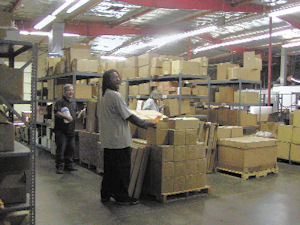When space opened up in the Chatsworth building leased by Replacement Parts Industries Inc. the timing couldn’t have been better. The after-market parts supplier for the health care industry was bursting at the seams and needed to expand. If room hadn’t become available at the building on Corisco Street, President and CEO Ira Lapides would have had no option but to move the company. Instead, Lapides renegotiated his lease with the landlord and took over the entire building. Customer service, product engineering and the warehouse now have enough room to accommodate their respective staffs. Growing physical space is not all that Lapides plans for the company co-founded by his father nearly 40 years ago. “We are hoping to do some additional hiring this year but we need to see how things go,” Lapides said. As the supplier for replacement parts for sterilizers, exam tables, lights used by doctors and dentists, and other equipment essential for a medical practice or hospital, RPI’s services are always in need. The company reverse engineers the parts and then sub-contracts the manufacturing to small job shops in Southern California, many in the San Fernando Valley area. RPI has worked with some of these companies for years. They come from a background of supplying the aerospace industry so there isn’t a job order they are not capable of producing. KDL Precision Molding in Pacoima is among those local companies that RPI and Lapides works with. KDL is a custom molder that makes replacement seals and gaskets for RPI. Domestic manufacturing David Wyckoff, one of the co-owners of KDL, said he was thrilled that Lapides relies on domestic manufacturers rather than ones overseas that would be cheaper to use. Because of the type of rubber replacement parts KDL makes, Lapides probably would not be comfortable with using a foreign supplier, Wyckoff said. “We monitor the raw materials and make sure it is what is ordered and agreed upon and ideal for their applications,” Wyckoff added. The company keeps a large inventory of parts on hand so that it can do quick turnarounds on orders for critical parts. It sells directly to hospitals that have their own in-house technicians to make the repairs, and to technicians who service equipment in individual doctor, dentist and veterinary offices. While there is competition in after-market parts for hospitals and medical offices, there are few companies using the reverse engineering method used by RPI. The firm is also one of the few that obtained ISO 9000, an internationally-recognized standard of management certification, which has been a boost to RPI getting overseas orders. Founded by father It was Lapides’s father, Al, and an uncle, who started the business and got it using the reverse engineering method of taking an existing part and analyzing how it was designed. The younger Lapides wouldn’t join the company until the mid-1990s after he had spent nine years as an executive with an area HMO. From that experience, Lapides learned a lot from the senior management especially when it came to properly managing growth. As the president and chief executive, Lapides describes his role as the director of the growth and expansion. The strategy used by RPI is to stay in constant communication with customers on what equipment they are using and in product development. RPI has been looked at as a possible acquisition target but rarely are the purchasers serious, Lapides said. Making an acquisition of his own does interest Lapides but it would take significant resources that RPI does not have, particularly because he would go out of state to find the company to buy. “Our growth is really internally driven,” Lapides said.
